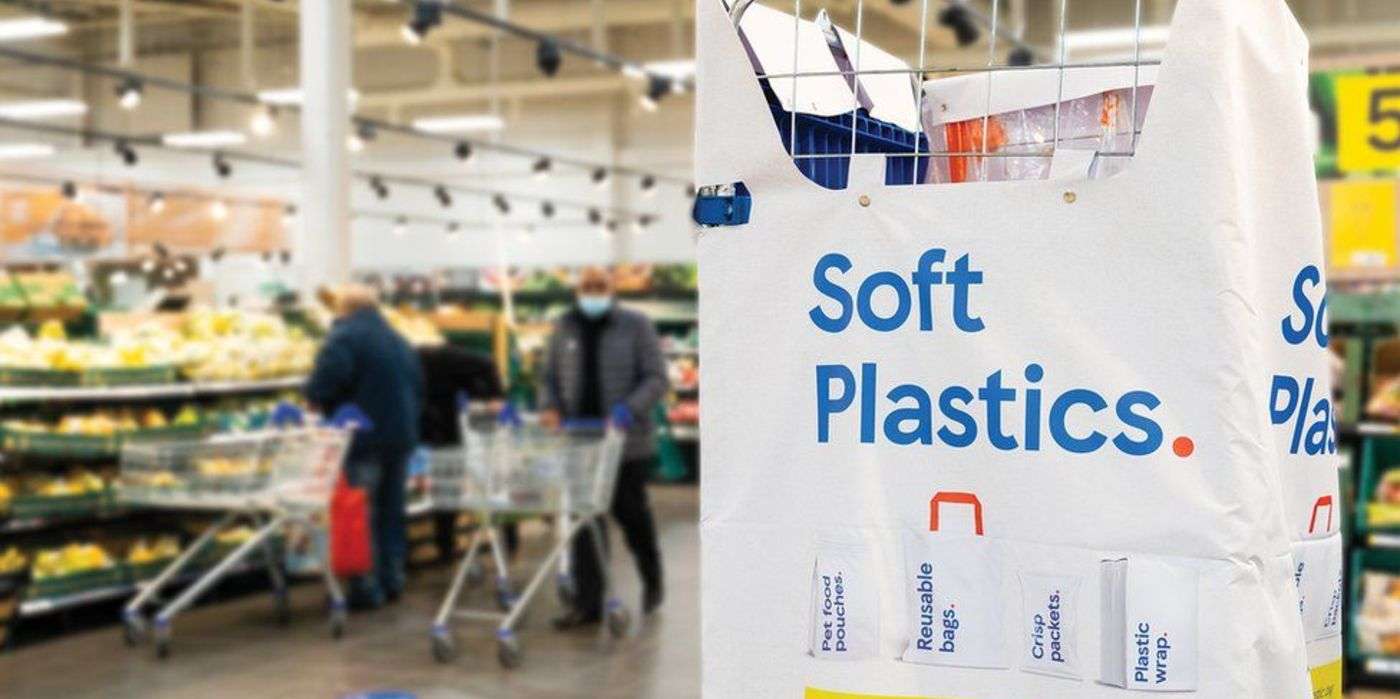Boat-Plane Hybrid That Needs No Runway Could Transform Travel from LA to San Diego, Boston to NYC
Short trips along coastlines will become incredibly short thanks to the REGENT seaglider, a plane-hydrofoil hybrid with zero-emissions.

By working with its suppliers, Tesco managed to permanently remove one billion pieces of plastic from its UK stores in 2020.
Customers at Britain's largest grocery store chain now see much less plastic when they do their shopping, including there being no more plastic shrink wrap on multipacks of soups, corn, and other tinned items including Heinz baked beans.
Shoppers are also no longer seeing secondary lids on products like yogurts and cream. There are no small plastic bags available for packing vegetables, pastries, and loose fruit; there's no unnecessary plastic in holiday products like crackers, and no more plastic covers on no-label and branded greetings cards from companies like Hallmark—this last move alone is already saving 44 million pieces of plastic from being used a year.
Tesco's decision to remove a billion plastic pieces from its packaging is part of a larger strategy to tackle plastics through its ‘4Rs packaging strategy': To remove it where it can, reduce where it can't, reuse more, and recycle what's left.
The strategy has seen a business-wide program of change that assesses every piece of packaging and removes all unnecessary and non-recyclable material.
Tesco Quality Director, Sarah Bradbury, said in a statement: "Our own-label and branded suppliers have had a lot to contend with in 2020, so removing a billion pieces of plastic is fantastic progress. Our work to Remove, Reduce, Reuse and Recycle will continue into 2021 —there is no place for unnecessary or non-recyclable packaging in our business.
Paula Chin, Sustainable Materials Specialist, at the World Wildlife Fund, lauded Tesco's moves to reduce plastic pieces from its stores, saying, "Plastic pollution continues to be one of the most visible symptoms of the environmental crisis we're currently facing.
"Businesses, governments, and households have all got an important part to play, so it's encouraging to see Tesco delivering against their commitments to significantly reduce the amount of plastic we use."
CHECK OUT: America's Largest Grocery Store Chain is Saying Goodbye to Single-Use Plastic Bags
Last year, Tesco met with 1,500 suppliers to let them know packaging will form a key part of its decision-making process which determines what products are sold in stores—with the retailer making it clear it reserves the right to no longer stock products that use excessive packaging or hard to recycle materials.
The company reports that, since the launch of the 4Rs strategy in August 2019, and in addition to removing a billion pieces of plastic, Tesco has reduced the size of its annual packaging footprint by 3,480 tonnes.
Customers at Britain's largest grocery store chain now see much less plastic when they do their shopping, including there being no more plastic shrink wrap on multipacks of soups, corn, and other tinned items including Heinz baked beans.
Shoppers are also no longer seeing secondary lids on products like yogurts and cream. There are no small plastic bags available for packing vegetables, pastries, and loose fruit; there's no unnecessary plastic in holiday products like crackers, and no more plastic covers on no-label and branded greetings cards from companies like Hallmark—this last move alone is already saving 44 million pieces of plastic from being used a year.
Tesco's decision to remove a billion plastic pieces from its packaging is part of a larger strategy to tackle plastics through its ‘4Rs packaging strategy': To remove it where it can, reduce where it can't, reuse more, and recycle what's left.
The strategy has seen a business-wide program of change that assesses every piece of packaging and removes all unnecessary and non-recyclable material.
Tesco Quality Director, Sarah Bradbury, said in a statement: "Our own-label and branded suppliers have had a lot to contend with in 2020, so removing a billion pieces of plastic is fantastic progress. Our work to Remove, Reduce, Reuse and Recycle will continue into 2021 —there is no place for unnecessary or non-recyclable packaging in our business.
Paula Chin, Sustainable Materials Specialist, at the World Wildlife Fund, lauded Tesco's moves to reduce plastic pieces from its stores, saying, "Plastic pollution continues to be one of the most visible symptoms of the environmental crisis we're currently facing.
"Businesses, governments, and households have all got an important part to play, so it's encouraging to see Tesco delivering against their commitments to significantly reduce the amount of plastic we use."
CHECK OUT: America's Largest Grocery Store Chain is Saying Goodbye to Single-Use Plastic Bags
Last year, Tesco met with 1,500 suppliers to let them know packaging will form a key part of its decision-making process which determines what products are sold in stores—with the retailer making it clear it reserves the right to no longer stock products that use excessive packaging or hard to recycle materials.
The company reports that, since the launch of the 4Rs strategy in August 2019, and in addition to removing a billion pieces of plastic, Tesco has reduced the size of its annual packaging footprint by 3,480 tonnes.
Tesco has also made good progress improving the recyclability of its packaging. Since it asked suppliers to use a defined list of easy-to-recycle materials and formats in 2018, it has removed over 11,000 tonnes of the hardest-to-recycle materials. That's good news indeed.
(WATCH Tesco's video about their move to ditch plastics below.)
SHARE This Positive Trend in Plastics on Social Media…
Be the first to comment